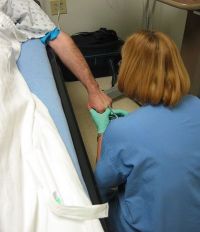According to an article published in The Annals of Thoracic Surgery, laboratory testing among patients undergoing cardiac surgery can lead to excessive bloodletting and can increase the risk of developing hospital-acquired anaemia and the need for blood transfusion.
Previous research already shows that patients who receive blood transfusions during heart surgery have more infections after surgery. They also tend to spend more time on the ventilator and die more frequently.
Colleen G. Koch, MD, MS, MBA, from the Cleveland Clinic in Ohio and colleagues examined every laboratory test from 1894 patients who underwent cardiac surgery from January to June 2012. All types of blood tests that were performed on these patients were recorded from the time they met the surgeons till the time they were discharged from the hospital.
The findings show that 221,498 laboratory tests were performed during the study period. This translates into 116 tests per patient. The cumulative median phlebotomy volume was 454 mL per patient. There was a difference between patients in the ICU and other hospital floors because the ICU patients had more blood drawn (around 332 mL).
“We were astonished by the amount of blood taken from our patients for laboratory testing. Total phlebotomy volumes approached 1 to 2 units of red blood cells, which is roughly equivalent to 1 to 2 cans of soda,” said Dr. Koch.
The study also showed that patients who were undergoing combined coronary artery bypass surgery and valve procedures were associated with higher overall phlebotomy volume. In addition, the researchers found that as the cumulative phlebotomy volume increased, the need for blood products also increased. Similarly, the longer a patient remained hospitalised, the more his blood was taken which in effect, increased the need for a red blood cell transfusion.
The researchers highlight the need for patients to play a more active role and to feel empowered enough to ask their doctors whether a specific test is necessary and if yes, to question the indication for the test and its impact on the current care. Patients should inquire whether it is possible to use smaller volume test tubes for tests that are absolutely necessary. In short, every effort should be made to conserve the patient's blood.
In another commentary published in the same issue of The Annals, Milo Engoren, MD, from the University of Michigan in Ann Arbor, also emphasised the importance of reducing blood loss as it can help in decreasing complications after surgery. He stressed that minimising post-operative blood loss is as important as minimising intraoperative blood loss. Avoiding anaemia and transfusion is decidedly the best course for all patients.
Source: Society of Thoracic Surgeons
Image Credit: Wikimedia Commons



























